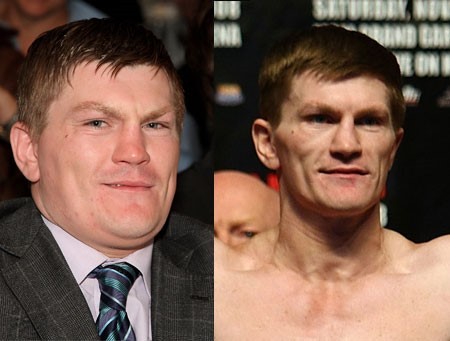
For a man who, in his day, was one of the world’s most successful boxers, it’s an odd sight when you catch glimpses of Ricky Hatton looking pale, bloated and distinctly unhealthy. Even at the height of his fighting career, you could catch him at any one time appearing as any other bloke his age might: several kilos overweight, looking like he could do with hitting the gym a couple of times a week and going easy on the fried food and beer.
But this is Ricky Hatton: we’ve all seen him at match fitness, lean and muscular and moving like a viper. So what’s the deal?

Hatton’s eating regime
Hatton’s known for yo-yo dieting. When he hits the off-season- when he isn’t in training or keeping himself match-fit- he lets himself go. He indulges in greasy cooked breakfasts, fatty steaks with chips on the side, Indian and Chinese takeaways, pints of beer… everything you don’t think of when you think of an athlete’s diet.

Then, when pre-season training begins, he changes completely. He empties his fridge of all the junk, throws out his takeaway menus and begins to eat like the formidable, athletic fighter we all know him to be. It’s a hard slog, to be sure: I always tell anyone who will listen that it’s far easier to stay in shape than to get in shape.
But this is Ricky Hatton: hard slogs are what he does. It’s quite a spectacle. Within a few weeks, Ricky Hatton replaces the bloated beer belly with a chiselled six pack. The unhealthy pallor is gone, and a champion emerges.
Nevertheless, it’s not role-model stuff.

My view
I don’t condone this kind of diet. I hesitate to judge Hatton- who wouldn’t?- but I have always been open with clients and readers about my thoughts on this kind of yo-yo diet. Perhaps the only thing worse than staying overweight and living on junk food is yo-yoing your diet, eating poorly and putting on weight before crashing into a healthy, calorie-controlled diet and shedding it. For reasons I’ll go into below, it’s very bad for you.
The perils of yo-yo dieting
Of course, Hatton worked with the best nutritionists and trainers, and so his oscillations were always very well managed. It’s also very common for athletes to relax their diets off-season, before keeping to stricter eating plans during pre-season training. He was also one of the fittest, fastest athletes going in his prime, so I’m not going to knock him- whatever he did clearly worked incredibly, so hats off to him for it.

The downsides
However, there are some definite downsides to this kind of rapid weight fluctuation, and I would try to dissuade most people from putting themselves through similar protocols. Issues with yo-yo dieting can include:
- Increased appetite and a tendency for your body to cling to energy stores. Many yo-yo dieters report greater weight gains in the long run than their original losses.
- Increased bodyfat percentage as a result of the above point. This could lead to hormonal changes, among others, that make losing weight harder.
- Fat gain, and weight cycling in particular, makes instances of fatty liver disease more likely.
- Atrophy as your body breaks down muscle. All weight loss programs should contain intake of good quality protein accompanied by exercise to stop this from happening.
- Increased risk of diabetes, especially in those who end up with more bodyfat than when they started.
- Often drastic spikes in blood pressure.
- A mental, emotional toll, as you see your hard-won results undone and feel stuck in a cycle over which you have little control.

My take on the Hatton style yo-yo diet
The main thing to realise on any eating plan, in any lifestyle, is that you have a fair amount of control. Even if it may not feel like it, you have the ability to react in multiple different ways to any given circumstance, and in this way change the course of your life and health.
Because of this, I don’t advocate starvation diets, quick fixes, sudden, short fasts… anything that gives you fast results without allowing you to learn positive lifestyle habits. These are rash, panicked actions to a situation over which you feel a desperate lack of control. Your sudden weight loss will be accompanied by a sudden weight gain. Of course, Hatton has always done this for athletic reasons- and, realistically, he never got that big. But people all over the world find themselves stuck in a yo-yo cycle, stuck in this desperate loop, and the answer to it is both simple and hard.

Take a deeper breath, take control, and take a longer view. Lose the weight gradually and begin to exercise as you do so. Don’t have weight loss as a sole goal: couple it with eating more healthily in general, learning to prepare and enjoy healthy foods, and with getting fit and active. Cheat sometimes, purposefully, and take the odd lazy day, but keep it balanced and continue to do so for the rest of your life.
This kind of balanced diet will be far healthier in the long run than dropping ten kilos in one month and piling it back on the next will ever be.




